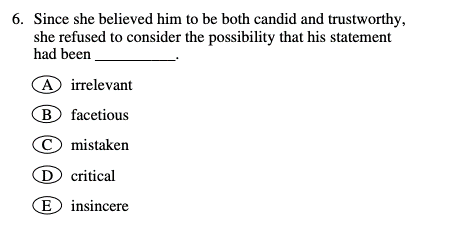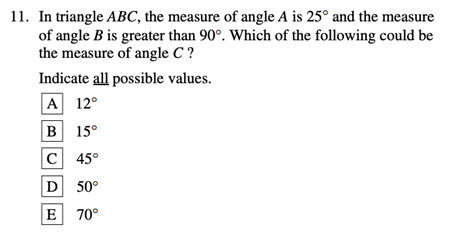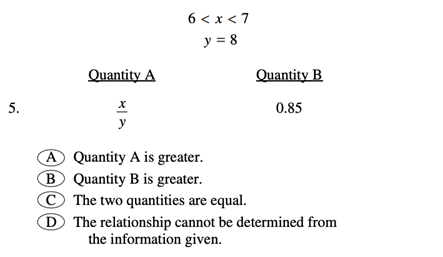Curious about the GRE and its role in your graduate school applications? You've come to the right place! In this blog post, we’ll provide you with a clear understanding of the GRE’s purpose, structure, and all the essential details you need to know.
Here's a quick overview of what you'll learn in this GRE guide:
How the GRE influences the graduate school admissions process
A breakdown of the test's content and its various sections
Upcoming changes to the GRE’s content starting in September 2023
Why some test-takers consider the GRE to be hard
How the computer-adaptive GRE works
The length of the test
Tips on how to study for the exam
Why you may consider taking GRE Subject Tests
An overview of the fees
How to register for the exam
Let's begin!
TABLE OF CONTENTS
(click to skip ahead)What is the GRE?
The GRE is a standardized test used for admission to graduate programs around the world (though primarily in the US and Canada). The GRE assesses your readiness for advanced academic study, specifically measuring your critical thinking, analytical writing, verbal reasoning, and quantitative reasoning skills.
What does the GRE stand for?
The acronym "GRE" stands for the Graduate Record Examination. The test is administered by the Educational Testing Service (ETS).
Who needs to take the GRE?
You may consider taking the GRE if you aspire to pursue a master's or doctoral degree in fields such as the social sciences, natural sciences, engineering, and humanities. A growing number of universities also accept GRE scores to satisfy the application requirements for law school and business school.
However, GRE scores are not required for or accepted by all graduate programs (many law schools, for example, require the LSAT, and many business schools use the GMAT). So, it's important to check the official admissions requirements of each graduate program you intend to apply for before registering for the GRE.
What is the GRE for?
While the GRE is not the sole criterion for graduate school admission, it is an important piece of the application process for many programs. Why?
Here are several reasons graduate schools use the GRE as an admissions requirement:
Standardized evaluation
The GRE provides a standardized measure of an applicant's abilities, enabling universities to compare applicants on a level playing field. It helps admissions committees assess applicants from diverse educational backgrounds and make fairer admissions decisions.
Benchmarking applicants
By incorporating GRE scores into their evaluation process, graduate school admissions committees establish a benchmark for applicant comparison. It helps them identify candidates with the academic skills and potential to thrive in their graduate programs.
Comprehensive skill assessment
The GRE assesses a range of skills crucial for success in graduate studies. The verbal reasoning sections evaluate reading comprehension and vocabulary skills, the quantitative reasoning sections measure mathematical abilities, and the analytical writing section gauges an individual's ability to articulate complex ideas and arguments.
What's on the GRE?
The GRE consists of three primary sections: Analytical Writing, Verbal Reasoning, and Quantitative Reasoning. Let's look at each section so you know what to expect.
GRE Analytical Writing
The Analytical Writing section measures your ability to think critically and express your ideas effectively. It consists of two tasks that you'll have 60 minutes (30 minutes per task) to complete:
Analyze an Issue: You will be presented with a specific topic or statement and asked to analyze it and provide your perspective. You must develop a well-structured essay that presents a clear argument supported by relevant examples and reasoning.
2. Analyze an Argument: In this task, you will critically evaluate an argument by identifying its strengths and weaknesses. Your response should focus on logically assessing the reasoning, evidence, and assumptions presented in the argument.
GRE Verbal Reasoning
The Verbal Reasoning section assesses your ability to understand and analyze written texts, draw inferences, and evaluate information. There are two Verbal Reasoning sections, with each consisting of 20 questions in one of the following formats:
Reading Comprehension: These questions test your ability to comprehend and analyze complex passages from various fields. You'll be required to answer questions about the main ideas, supporting details, tone, and the author's purpose. You'll need to answer ten reading comprehension questions.
2. Text Completion: These questions have sentences with one or more blanks; you'll need to select the appropriate word or phrase to complete the sentence. These questions test your understanding of vocabulary and sentence structure. You'll need to answer six text completion questions.
3. Sentence Equivalence: You'll be presented with a sentence with blanks, and you must choose two words or phrases from the given options that would create sentences with similar meanings when inserted into the blank. You'll need to answer four sentence equivalence questions.
GRE Quantitative Reasoning
The Quantitative Reasoning section evaluates your ability to understand, analyze, and solve quantitative problems. It covers both basic math concepts and higher-level math skills. There are two Quantitative Reasoning sections, with each consisting of 20 questions in one of the following formats:
Multiple-choice Questions:
One Correct Answer: These questions present a problem or scenario, followed by multiple answer choices. You need to select the one correct answer among the given options.
Select One or More: These questions provide multiple answer choices, and you need to select one or more correct answers from the options.
2. Numeric Entry Questions: These questions require you to enter a numeric value directly into a box. You must provide the exact numerical answer.
3. Quantitative Comparison: These questions compare two quantities and ask you to determine the relationship between them. You need to determine if one quantity is greater, less, or equal to the other, or if the relationship cannot be determined from the information given.
2023 changes to the GRE
Starting September 22, 2023, the GRE will have fewer questions per section. Here’s a quick overview of how the test will look then:
1 Analytical Writing essay task
2 Verbal Reasoning sections with 27 questions total
2 Quantitative Reasoning sections with 27 questions total
How hard is the GRE?
The GRE is a challenging exam. However, the difficulty level can vary from test taker to test taker. Here are some factors that contribute to why some test takers find the GRE to be particularly hard.
Broad range of content
Test takers need to have a solid understanding of various topics, such as advanced vocabulary, math concepts, reading comprehension, and essay writing.
Time constraints
Test takers must complete each section of the GRE within a specific time limit, which adds pressure and requires efficient pacing and time management skills.
Complex questions
The GRE includes complex questions that may require critical thinking, problem-solving abilities, and the application of concepts in unfamiliar contexts. These challenging questions demand careful analysis and the ability to choose the best answer from multiple options.
Preparation Required
Preparing for the GRE requires a significant investment of time and effort to review content, practice questions, and develop test-taking skills. The challenge lies in balancing preparation alongside other commitments and maintaining a consistent study schedule.
Computer-Adaptive Format
The computer-adaptive nature of the GRE can add an extra layer of difficulty. Because the test adapts to the test taker's performance, the questions can become progressively more challenging. Some may find this format intimidating and feel that it pressures test takers to perform well from the beginning.
How Does the Computer-Adaptive GRE Work?
The Computer-Adaptive GRE, or Computer-Adaptive Test (CAT) format, is a unique feature of the GRE that tailors the test experience to each test taker.
Unlike a traditional paper-based exam, where all test takers receive the same set of questions, the computer-adaptive format adapts the difficulty of the questions based on your performance.
And unlike some other adaptive tests, the GRE is section-adaptive rather than question-adaptive, meaning that how you do with one section impacts the difficulty of the next section of that same kind. Note that this applies to the two verbal sections and two math sections, not to the Analytical Writing section.
Here's how it works:
Starting point
The first quant and first verbal sections of the GRE are of medium-level difficulty. The computer selects questions of moderate difficulty and presents them to the test taker. How many questions you answer correctly will impact whether the same type of section later in the exam is of easier, harder, or the same difficulty (that’s overall section difficulty—it will still contain a range of easier and harder questions).
Adaptive algorithm
If the test taker answers, say, 4 out of 20 questions correctly in the first verbal section, then the second verbal section will mostly contain easier questions (but these will be worth fewer points). Or conversely, if a test taker answers something like 19 out of 20 questions correctly, the next verbal section will contain questions with mostly harder difficulty, but also with greater point values.
Please note that no one really knows how many right or wrong answers in the first section of a type will lead to an easier or harder second section of that type—we’ve just made up the examples above for illustrative purposes.
Why does the GRE use the CAT format?
The GRE's adaptive algorithm aims to determine the test taker's ability level with precision and efficiency. By presenting questions tailored to the individual's skill level, the computer-adaptive GRE can efficiently evaluate the full range of a test taker's abilities within a shorter testing time.
How long is the GRE?
Currently, the total duration of the GRE is approximately 3 hours and 45 minutes. Here’s a breakdown of how much time you’ll have for each section and the breaks.
| Section | Time Allotted |
|---|---|
| Analytical Writing | 1 hour (30 mins per task) |
| Verbal Reasoning | 1 hour (30 minutes per section) |
| Quantitative Reasoning | 1 hour and 10 minutes (35 minutes per section) |
| Unscored / Research Section (if applicable) | Varies (typically around 20-35 minutes) |
| Breaks | Around 10 minutes per break |
On September 22, 2023, the GRE will be shortened to under 2 hours as there will be fewer questions. Here’s a breakdown of how much time you’ll have for each section when this change goes into effect.
| Section | Time Allotted |
|---|---|
| Analytical Writing | 30 minutes (only 1 task) |
| Verbal Reasoning | 41 minutes |
| Quantitative Reasoning | 47 minutes |
How to study for the GRE
Studying for the GRE requires a structured approach and consistent effort. Here are some general study tips to help you prepare effectively.
Assess your strengths and weaknesses
Start by taking a diagnostic test or practice exam to identify your strengths and weaknesses in each section. This assessment will help you understand which areas require more focus during your preparation.
The ETS allows you to take two scored practice tests for free. You can use one of those tests for your diagnostic assessment. Click here to find the GRE practice tests (scroll to the bottom of the page to find the free POWERPREP® Online Practice Tests).
Create a study plan
Based on your assessment, create a study plan that outlines your study schedule, topics to cover, and milestones to achieve. Break down your preparation into manageable chunks and allocate sufficient time to cover each section.
Use official study materials
In addition to the free practice tests, the ETS offers official study materials for purchase. These include the Official GRE Guide, Official GRE Practice Tests, and the GRE POWERPREP® software. These resources provide authentic practice questions and simulate the actual test experience.
Allocate sufficient time
Give yourself at least 2 to 3 months to prepare for the GRE. Depending on your circumstances, you may need more or less time. Either way, make sure you’re able to cover all the necessary content, practice all question types, and take several mock exams.
Practice regularly
Set aside dedicated study time daily and regularly take full-length practice tests to build endurance and improve your performance. Focus on both accuracy and time management to enhance your test-taking skills.
Review challenging content and concepts
While practicing questions, pay attention to areas where you struggle and review the relevant content and concepts. Strengthen your understanding of key vocabulary, mathematical formulas, and problem-solving strategies.
Seek additional resources and support
Consider joining study groups, enrolling in GRE prep courses, or working with a tutor if you prefer structured guidance and accountability. These resources can provide additional insights, strategies, and personalized feedback to enhance your preparation.
What are GRE subject tests?
Unlike the General GRE, which evaluates general skills, GRE Subject Tests assess your knowledge and expertise in specific academic disciplines. Some graduate programs, particularly in the United States, use the GRE Subject Tests as an additional criterion for admission to specialized programs.
Currently, the GRE Subject Tests are available in the following areas:
Mathematics: This subject test covers various topics in mathematics, including calculus, algebra, and geometry.
Physics: This subject test assesses understanding of classical mechanics, electromagnetism, atomic physics, thermodynamics, quantum mechanics, and other physics concepts.
Psychology: This subject test assesses knowledge on various topics typically covered in undergraduate psychology courses, including cognition, social behavior, developmental processes, and psychological disorders.
GRE cost
Here are the general fees you’ll need to pay to register for the GRE.
| Test Type | Fee |
|---|---|
| GRE General Test | $220 (additional fees apply if you take the test in China or India) |
| GRE Subject Tests | $150 |
Here also are some additional fees you may need to pay or special requests before or after the exam.
| Special Request | Fee |
|---|---|
| Rescheduling fee | $50 |
| Changing your test center | $50 |
| Changing your Subject Test | $50 |
| Late online registration fee (for Subject Tests) | $25 |
| Standby testing (for Subject Tests) | $50 |
| Additional score report | $30 |
| Score reinstatement | $50 |
GRE Fee Reduction Program
If you can demonstrate financial need, you may also qualify for a GRE Fee Reduction Voucher, which can be used for one GRE General Test and/or one GRE Subject Test. Learn more about how to apply for the Fee Reduction Voucher.
How to register for the GRE
When you’re ready, follow these steps to register for the GRE:
Step 1 - Create an ETS account
Start by creating an account on the official GRE website of the Educational Testing Service (ETS). Click the "Create an Account" button and provide the necessary information.
Step 2 - Select the test type
Once you have created an account, log in and select the "Register for a Test" option. Choose whether to register for the GRE General Test or a GRE Subject Test.
Step 3 - Choose the test location and date
Select your preferred test location and available test date. Keep in mind that test dates and locations may vary, so it's recommended to register well in advance to secure your desired options.
You may also have the option to choose at-home testing for the GRE General Test if your computer and environment meet the ETS’s qualifications. At-home testing is available seven days a week. Learn more about at-home testing for the GRE.
Step 4 - Provide personal information
Fill in the required personal information, including your name, contact details, and identification information. Ensure that the information matches your identification documents.
Step 5 - Agree to policies
Review and accept the test policies, including the privacy policy and test taker agreement.
Step 6 - Pay the exam fee
Proceed to pay the exam fee(s) using a valid credit or debit card.
Step 7 - Receive confirmation
After successful payment, you’ll receive a confirmation email containing important details about your test registration. Review the information carefully and ensure it’s accurate.
Final thoughts
Taking the GRE is a significant milestone as you prepare to pursue graduate studies. We hope this guide has helped to clear any doubts you may have had about the exam.
If you're looking for additional resources to prepare for graduate school, we recommend speaking with our graduate school admissions consultants. We can help you craft a strong statement of purpose and navigate the graduate school admissions process.
If you want to explore options for support with your applications, schedule a consultation and begin taking the next step in your grad school journey!
Ameer is a freelance writer who specializes in writing about college admissions and career development. Prior to freelancing, Ameer worked for three years as a college admissions consultant at a Hong Kong-based education center, helping local high school students prepare and apply for top colleges and universities in the US. He has a B.A. in Latin American Studies from the University of Chicago and an M.A. in Spanish Linguistics from UCLA. When he’s not working, Ameer loves traveling, weight lifting, writing, reading, and learning foreign languages. He currently lives in Bangkok, Thailand.
Top values: Growth / Diversity / Empathy



















